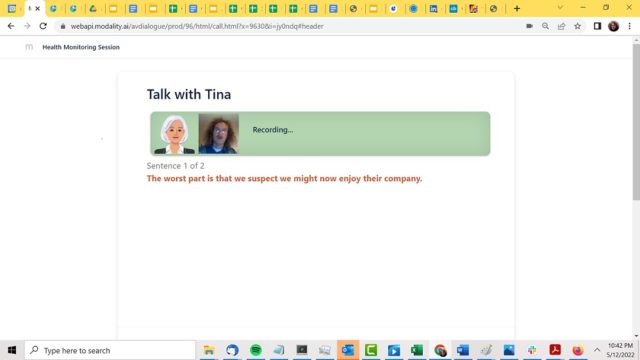
Conversation is a well-established diagnostic tool. For disorders such as Parkinson’s disease and amyotrophic lateral sclerosis, patient assessments include interviews during which observations are noted about cognitive capacity, language use, and muscle movement. Such assessments have been part of neurological exams for years but David Suendermann-Oeft, CEO of medical technology startup Modality.ai, contends they are overdue for an upgrade.
Modality has developed software that replaces the human interview with a virtual one. Patients speak and answer questions as they normally would, but they talk to Tina, a conversational artificial intelligence system. In addition to assessing a patient’s speech, the technology also uses computer vision to monitor facial movements. Tina objectively gathers measurements that can be used to diagnose neurological conditions, assess disease progression, and to also gauge how well a drug is working. The FDA recently listed the Modality technology as a class II medical device under the software as a medical device category.
A single clinician can only interview one patient at a time. The process is just not scalable, Suendermann-Oeft said. Tina can handle thousands of assessments. But for patients, the experience is intended to be a personal one. Modality designed Tina to be self-explanatory so no special instructions are needed. She guides the patient through the entire assessment, which can be done at the user’s leisure on any consumer device that has a camera and a microphone.
“People love to engage with Tina because she’s always there for you and she’s non-judgmental,” Suendermann-Oeft said. “She doesn’t care if your pronunciation is terrible.”
San Francisco-based Modality was founded by experts of dialog systems, which are now more commonly referred to as virtual agents or virtual assistants. That research involved building industry-grade systems for telephone-based interactions at technology companies—work that was done well before Amazon’s Alexa and other consumer-facing assistants, Suendermann-Oeft said. Modality stems from an effort to bring the capabilities of dialog systems to the medical field. Modality was one of the companies that presented during the Pitch Perfect contest at the recent MedCity INVEST conference in Chicago. The startup was judged co-winner in the pharmatech category.
“As we begin to see more neuro interventions coming to the market, the solution that Modality.ai delivers becomes increasingly important,” said Jessica Federer, partner at Boston Millennia Partners and one of the judges for the category. “Having reliable assessments on demand to support diagnostics and monitoring moves the entire field forward.”
Suendermann-Oeft emphasized that Modality is not trying to replace clinicians. Diagnosis and treatment decisions are still up to doctors. But Tina helps inform those decisions. The patient’s responses are recorded and catalogued. The technology analyzes how fast and how loud the responses were. Facial movements during those responses are also analyzed. Making these assessments virtual frees clinicians to do other tasks.
“Time is an issue for clinicians, definitely, and so is, in many cases, the absence of objective measures,” Suendermann-Oeft said. “Right now, ALS patients undergo a single speech test. There is no capacity to do more, no way to even observe or measure with any of the therapies, any positive or negative effect.”
Tina can also be used to assess approved and experimental drugs. For pharmaceutical companies, a key pain point is clinical testing of experimental central nervous system drugs, which have been dogged by study failures. Modality is still building awareness in the pharmaceuticals space but Suendermann-Oeft said Tina offers the prospect of objective assessments conducted more efficiently. Those features could help make clinical trials faster and potentially reduce the failure rate, he said.
Since its start in 2018, Modality has raised $2.6 million, most recently a seed financing last year. The company is now raising a financing round targeting $5 million. Suendermann-Oeft said his company will use the capital to expand commercialization of the technology. Modality does not provide its software directly to clinicians and researchers. The startup works with channel partners that already have a relationship with clinical sites or pharmaceutical companies; Tina is integrated into a larger software offering. For example, if a company is providing technology used for decentralized clinical trials, Tina becomes part of that offering.
Modality provides Tina under a software-as-a-service business model, charging a per-patient, per month fee. Tina’s recent FDA classification as a medical device is key here, as it enables providers to claim reimbursement from the use of the technology for neurological assessments. Modality.ai owns a corporation in Germany that is now also expanding to Finland. That company will be pursuing a CE Mark to lay the groundwork for marketing the software to healthcare sites Europe.
Since Modality started, Suendermann-Oeft says tens of thousands of individuals representing a wide range of ages have spoken to Tina as part of some type of assessment. Feedback from those users have shaped and refined the software, which is now on version 30. Suendermann-Oeft said that many of the suggested changes have helped make the technology easier to use. The FDA clearance for Tina is disease agnostic. The technology has been selected for monitoring patients in clinical trials in ALS, Parkinson’s, autism, depression, and schizophrenia. Suendermann-Oeft said that the technology has been particularly well received by those with anxiety.
“These people normally don’t speak to anyone, let alone psychiatrists,” he said. “But they do speak to Tina, which is something that was remarkable to see.”
Screenshot of Tina by Modality.ai








